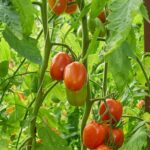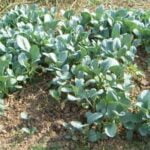When it comes to growing a successful vegetable garden, pest control is an essential aspect that cannot be overlooked. Every gardener knows the frustration of seeing their hard work threatened by pests that can damage or even ruin their crop.
While there are various methods available for controlling pests in vegetable gardens, many gardeners are turning to natural alternatives, such as peppermint oil. But before considering this option, it is crucial to understand the potential risks and benefits associated with using peppermint oil in vegetable gardens.
As gardeners strive for organic and chemical-free solutions, peppermint oil has gained popularity as a natural pest repellent. This aromatic essential oil is known for its refreshing scent and its ability to deter insects and other pests from infesting plants. However, while it may seem like an appealing choice due to its natural origin, it is essential to delve deeper into the science behind peppermint oil’s efficacy and evaluate its safety when used in vegetable gardens.
In this article, we will explore what makes pest control a crucial aspect of vegetable gardening and why finding safe and effective methods is essential for gardeners. We will also dive into the potential risks and benefits of using peppermint oil as a pest repellent in vegetable gardens, examining the scientific evidence behind its effectiveness.
By the end of this article, you will have a comprehensive understanding of whether or not peppermint oil is safe to use in your own vegetable garden and how you can make an informed decision about incorporating it into your pest control strategy.
Understanding the Potential Risks and Benefits of Using Peppermint Oil in Vegetable Gardens
Peppermint oil is a popular natural pest control method used in vegetable gardens. Before deciding to use this essential oil, it is important to understand both the potential risks and benefits associated with its use.
One of the main benefits of using peppermint oil in vegetable gardens is its effectiveness as a natural pest repellent. Peppermint oil contains compounds such as menthol and limonene, which have been found to repel a wide range of pests including aphids, ants, beetles, and caterpillars. By applying peppermint oil to your vegetable plants, you can help deter these unwanted pests and protect your garden from damage.
However, it is also important to be aware of the potential risks associated with using peppermint oil in vegetable gardens. While peppermint oil is generally considered safe for use on most vegetable plants, some sensitive plants may be adversely affected.
It is recommended to test a small area of your vegetable garden before applying peppermint oil to the entire garden. Additionally, some beneficial insects such as bees and ladybugs may also be repelled by peppermint oil, which could disrupt the balance of your garden ecosystem.
To safely and effectively use peppermint oil in your vegetable garden, follow these step-by-step guidelines:
- Dilute the peppermint oil: Mix 10-15 drops of peppermint essential oil with one quart of water.
- Spray the mixture onto your vegetable plants: Use a spray bottle or garden sprayer to evenly distribute the diluted peppermint oil onto each plant.
- Reapply as needed: Depending on the severity of pest infestations, you may need to reapply the peppermint oil every few weeks or after heavy rainfall.
By understanding both the potential risks and benefits associated with using peppermint oil in vegetable gardens, you can make an informed decision on whether or not it is suitable for your specific gardening needs. Remember to always follow proper dilution and application techniques to ensure the safety and effectiveness of peppermint oil in your vegetable garden.
The Science Behind Peppermint Oil
Peppermint oil has gained popularity as a natural pest repellent in vegetable gardens due to its effectiveness and safety. Understanding the science behind how peppermint oil works as a natural pest repellent can help gardeners make informed decisions about using it in their own vegetable gardens.
Chemical Composition of Peppermint Oil
Peppermint oil is derived from the leaves of the peppermint plant (Mentha × piperita) through a process of steam distillation. The oil contains various chemical compounds, with the main active components being menthol and menthone. These compounds contribute to the distinct aroma and flavor of peppermint, but they also have insecticidal properties that repel pests.
The Repellent Effect
Peppermint oil works as a natural pest repellent by interfering with the sensory receptors and feeding behavior of insects. The strong scent of peppermint oil masks the pheromones and other attractants that pests use to locate food sources in vegetable gardens. This confusion disorients pests and makes it difficult for them to find their target plants.
Additionally, some studies have shown that certain compounds in peppermint oil, such as limonene and pulegone, have toxic effects on pests when they come into direct contact. These compounds disrupt the nervous systems or cell membranes of insects, leading to their death or deterrence.
Specific Pest Repelling Properties
Different types of pests are repelled by different aspects of peppermint oil. For example, ants are particularly sensitive to the smell of peppermint oil, which disrupts their ability to communicate effectively and navigate towards food sources. Aphids, whiteflies, and spider mites also detest the smell of peppermint, causing them to seek alternative feeding grounds away from treated areas.
It is important to note that while many common pests are repelled by peppermint oil, it may not be effective against all types of pests. Some larger insects or rodents may not be significantly affected by the scent of peppermint oil. In these cases, additional pest control measures may be necessary.
Understanding the science behind how peppermint oil works as a natural pest repellent can empower gardeners to effectively and safely incorporate it into their vegetable gardens. By harnessing the power of peppermint oil, gardeners can naturally deter pests and protect their plants without the use of harmful chemicals.
Evaluating the Safety of Peppermint Oil
Peppermint oil is a popular natural pest control method for vegetable gardens, but many gardeners are concerned about its safety. It is important to evaluate whether peppermint oil is harmful to vegetables or beneficial insects before deciding to use it in your garden.
When used properly, peppermint oil is generally safe for vegetables. However, it is important to note that some plants may be more sensitive to the oil than others. It is recommended to conduct a small patch test on a few leaves of your plants before applying it widely.
Observe the plants over a few days and check for any signs of damage or wilting. If there are no adverse effects, it should be safe to use peppermint oil on your vegetables.
Beneficial insects play an important role in maintaining a healthy ecosystem in your garden. The good news is that peppermint oil does not harm beneficial insects such as ladybugs, bees, and butterflies. In fact, certain studies have shown that peppermint oil can even repel pests while attracting beneficial insects.
| Vegetable | Sensitivity to Peppermint Oil |
|---|---|
| Tomatoes | Tolerant |
| Lettuce | Sensitive |
| Cucumbers | Tolerant |
| Carrots | Tolerant |
Based on this table, it can be seen that tomatoes, cucumbers, and carrots are generally tolerant to peppermint oil. However, lettuce is more sensitive, so it is advised to use caution when applying the oil on lettuce plants.
Step-by-Step Guide
Choosing the Right Peppermint Oil
Before using peppermint oil in your vegetable garden, it is important to select the right type of oil. Look for high-quality, pure peppermint oil that does not contain any synthetic additives or fillers. Organic options are typically the best choice as they ensure that no harmful chemicals will be introduced into your garden. Additionally, consider purchasing peppermint oil with a concentration of at least 70% menthol, as this is the component responsible for its insect-repellent properties.
Diluting the Peppermint Oil
Once you have obtained the appropriate peppermint oil, it is crucial to dilute it before applying it to your vegetable garden. Peppermint oil is highly concentrated and can be too strong for direct use, potentially causing harm to your plants. To dilute the oil, mix one part peppermint oil with ten parts water in a spray bottle or watering can. Make sure to shake well to ensure proper mixing.
Applying Peppermint Oil
After diluting the peppermint oil, it’s time to apply it to your vegetable garden. Start by thoroughly inspecting your plants for any signs of pest infestation or damage. Pay close attention to undersides of leaves and stems where pests often hide. Once you have identified problem areas, generously spray or water the diluted peppermint oil onto affected plants and surrounding areas.
Frequency of Application
To effectively repel pests and keep them at bay, it is recommended to apply peppermint oil every 7-10 days or after heavy rainfall. This ensures that an adequate amount of scent remains present in your garden to deter pests continuously. However, avoid overusing peppermint oil as excessive application may lead to a buildup on plant surfaces and hinder their growth.
Additional Tips
To enhance the effectiveness of peppermint oil in your vegetable garden, consider implementing the following additional tips:
- Rotate the application areas of peppermint oil to cover all aspects of your garden and address different types of pests.
- Apply peppermint oil during calm weather conditions to prevent it from being easily blown away by wind.
- Begin using peppermint oil early in the growing season as a preventive measure against potential pest problems.
- Keep your garden clean and remove any decaying plant matter or debris that may attract pests.
By following this step-by-step guide, you can confidently and safely use peppermint oil in your vegetable garden to control pests and protect your precious crops.
Common Vegetable Garden Pests and How Peppermint Oil Can Help Control Them
In any vegetable garden, pests can pose a significant threat to the health and productivity of your plants. From aphids and caterpillars to beetles and mites, these pests can quickly infest your garden and cause extensive damage if left unchecked. Fortunately, peppermint oil can be an effective natural pest control method against many common vegetable garden pests.
Aphids
Aphids are small, sap-sucking insects that can cause stunted growth and yellowing foliage in vegetable plants. To control aphid infestations, you can create a homemade peppermint oil spray by mixing 10-15 drops of peppermint oil with a quart of water in a spray bottle.
Apply the solution directly on the affected areas of the plants, paying close attention to the undersides of leaves where aphids tend to gather. The strong scent of peppermint oil repels aphids and discourages them from feeding on your plants.
Caterpillars
Caterpillars are voracious eaters and can quickly munch their way through your vegetable garden, causing significant damage. Peppermint oil works as a deterrent against caterpillar infestations because they dislike the strong smell. To use peppermint oil against caterpillars, mix 10 drops of peppermint oil with a cup of water and spray it over the leaves of affected plants. Repeat this process every few days until the caterpillar problem is resolved.
Beetles
Beetles such as cucumber beetles, flea beetles,and Japanese beetles can wreak havoc on your vegetable garden by chewing up leaves and stems. Peppermint oil can help deter these pests from attacking your plants.
Create a mixture of 10-15 drops of peppermint oil with a quart of water in a spray bottle and apply it directly onto affected areas or around the perimeter of your garden to create a barrier. The scent of peppermint oil acts as a repellent and can discourage beetles from feeding on your plants.
Using peppermint oil to control common vegetable garden pests is an eco-friendly and cost-effective alternative to chemical pesticides. However, it’s important to note that while peppermint oil is generally safe for use in vegetable gardens, it may affect certain beneficial insects such as bees and ladybugs.
It’s crucial to apply the oil carefully and avoid spraying it directly on flowering plants where bees are likely to visit. Additionally, always follow the recommended dilution ratios when using peppermint oil and conduct a patch test on a small area of your plants before widespread application to ensure they tolerate the solution well.
Alternative Natural Pest Control Methods for Vegetable Gardens
While peppermint oil is a popular natural pest control method for vegetable gardens, there are also other effective alternatives that gardeners can consider. These methods can help to keep pests at bay without the use of harmful chemicals or pesticides. Here are some alternative natural pest control methods for vegetable gardens:
- Companion Planting: Companion planting involves planting certain plants together to repel pests or attract beneficial insects. For example, marigolds are known to deter aphids and nematodes, while attracting ladybugs which feed on aphids. Similarly, planting garlic near tomatoes can help to repel spider mites.
- Neem Oil: Neem oil is derived from the neem tree and acts as an insecticide by disrupting the feeding and reproductive cycles of pests. It is effective against a wide range of common garden pests such as aphids, whiteflies, and caterpillars.
- Diatomaceous Earth: Diatomaceous earth is a fine powder made from fossilized algae-like plants called diatoms. When pests come into contact with it, the sharp edges of the particles damage their exoskeletons, leading to dehydration and death. It is particularly effective against crawling insects like slugs, snails, and ants.
- Plant-Based Insecticidal Soaps: Insecticidal soaps are made from fatty acids derived from plant-based oils such as soybean or coconut oil. They work by suffocating soft-bodied pests like aphids, mealybugs, and thrips upon contact without leaving harmful residues on the plants.
Using a combination of these alternative natural pest control methods can provide gardeners with an effective and sustainable approach to managing pests in their vegetable gardens. It is important to note that these methods may require regular application and monitoring for optimal results.
| Alternative Pest Control Method | Common Garden Pests |
|---|---|
| Companion Planting | Aphids, nematodes, spider mites |
| Neem Oil | Aphids, whiteflies, caterpillars |
| Diatomaceous Earth | Slugs, snails, ants |
| Plant-Based Insecticidal Soaps | Aphids, mealybugs, thrips |
Precautions and Potential Side Effects of Using Peppermint Oil in Vegetable Gardens
While peppermint oil can be an effective natural pest control method for vegetable gardens, it is important to take certain precautions and be aware of potential side effects. This section will discuss the precautions that should be followed when using peppermint oil in your vegetable garden as well as the potential side effects that may occur.
Firstly, it is essential to always dilute peppermint oil before using it in your vegetable garden. Undiluted essential oils can be too strong and may cause damage to the plants. To dilute peppermint oil, mix a few drops with water or a carrier oil such as coconut or olive oil. The exact ratio will depend on the concentration of the peppermint oil you are using, so it is important to follow the instructions provided by the manufacturer.
Another precaution to keep in mind is to avoid spraying peppermint oil directly on edible parts of vegetables that are close to harvest. Although considered safe for consumption in small amounts, direct contact with undiluted peppermint oil can alter the taste and odor of vegetables. Instead, focus on spraying near base areas or around plants to keep pests away without affecting the quality of your crops.
It is also important to note that some individuals may have allergies or sensitivities to peppermint oil. If you or anyone working in your garden has a known allergy or sensitivity, it is best to avoid using peppermint oil or use it with caution. Additionally, if you notice any negative reactions such as skin irritation or respiratory problems after using peppermint oil, discontinue use immediately and seek medical attention if necessary.
By following these precautions and being aware of potential side effects, you can safely use peppermint oil as a natural pest control method in your vegetable garden. However, it is always recommended to conduct a patch test on a small area of your plants before applying it extensively throughout your garden to ensure there are no adverse effects.
Remember to always read and follow the instructions provided by the manufacturer to ensure safe and effective use of peppermint oil in your vegetable garden.
Success Stories
Many gardeners have successfully used peppermint oil in their vegetable gardens as a natural pest control method. These success stories are a testament to the effectiveness and safety of peppermint oil in repelling pests and protecting vegetables.
One gardener, Sarah, shared her experience using peppermint oil to keep aphids away from her lettuce crop. She diluted a few drops of peppermint oil in water and sprayed it onto the leaves of her lettuce plants.
Not only did the peppermint oil effectively repel the aphids, but Sarah also noticed that the scent of the oil added a pleasant aroma to her garden. She continued to use peppermint oil throughout the season, and her lettuce remained free from aphid infestation.
Another gardener, Michael, found success using peppermint oil to deter ants from his tomato plants. He mixed a small amount of peppermint oil with dish soap and water, creating a soapy solution with a hint of peppermint scent. Michael sprayed this mixture around the base of his tomato plants and along their stems. The ants were repelled by the smell, preventing them from climbing onto the plants and damaging them.
These success stories highlight the potential benefits of using peppermint oil in vegetable gardens. Not only does it provide an effective solution for pest control, but it also adds a pleasant aroma to the garden environment. Gardeners who have tried peppermint oil report positive results and continue to use it as part of their natural pest management strategy.
Conclusion
In conclusion, making an informed decision about using peppermint oil in your vegetable garden is essential for effective pest control while ensuring the safety of your plants and beneficial insects. Peppermint oil has shown potential as a natural and eco-friendly pest repellent due to its strong scent that repels unwanted pests. However, it is crucial to understand the science behind how peppermint oil works and its potential risks and benefits before incorporating it into your gardening routine.
When using peppermint oil, it is important to follow a step-by-step guide to ensure its safe and effective use in your vegetable garden. By diluting the oil properly and applying it strategically, you can help control common vegetable garden pests without causing harm to your plants or beneficial insects. Additionally, it is worth considering alternative natural pest control methods that may synergize well with peppermint oil for a comprehensive approach.
While many gardeners have reported success stories in their use of peppermint oil, it is important to take precautions and be aware of potential side effects. Some individuals may be sensitive or allergic to peppermint oil, so conducting a patch test before widespread application is advisable. It is also crucial to monitor your plants closely after applying peppermint oil and discontinue use if any adverse reactions occur.
Ultimately, when deciding whether or not to use peppermint oil in your own vegetable garden, consider the specific needs and circumstances of your garden. Pay attention to scientific research and advice from experienced gardeners, weighing the potential benefits against any risks involved. With proper understanding and careful application, peppermint oil can be a valuable tool in achieving a thriving vegetable garden while minimizing the impact on the environment.
Frequently Asked Questions
How do you use peppermint oil in a vegetable garden?
Peppermint oil can be effectively used in a vegetable garden as a natural and safe insect repellent. To use peppermint oil, you can create a spray by mixing a few drops of the oil with water and dish soap.
This mixture can then be sprayed on the leaves of your vegetables to deter pests like aphids, ants, and beetles. It is important to dilute the peppermint oil properly as it is highly concentrated and could potentially burn the plants if used undiluted.
Is peppermint oil safe for garden?
Yes, peppermint oil is generally considered safe for use in the garden. It is a natural product that does not contain harmful chemicals typically found in synthetic pesticides or insecticides.
When used properly and in moderation, peppermint oil should not harm beneficial insects or pollinators in your garden ecosystem. However, it is always recommended to conduct a patch test before applying any new substance to your entire garden to ensure there are no adverse reactions.
Can I spray my tomato plants with peppermint oil?
Yes, you can spray your tomato plants with peppermint oil to help protect them from certain pests. As mentioned earlier, creating a diluted mixture of water, dish soap, and peppermint oil can act as an effective repellent against pests like aphids and beetles which commonly affect tomato plants.
By regularly spraying your tomato plants with this mixture, you can help discourage these pests from infesting your crops without resorting to synthetic chemicals that may have harmful effects on both plant health and human consumption. Nonetheless, it’s advisable to test the spray on small areas of the plants first to check for any adverse reactions before treating the entire plant.

If you’re looking to get into vegetable gardening, or are just looking for some tips on how to make your current garden better, then you’ve come to the right place! My name is Ethel and I have been gardening for years. In this blog, I’m going to share with you some of my best tips on how to create a successful vegetable garden.





